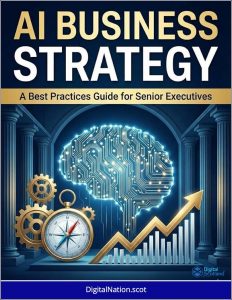 As DGIT reports a Royal Society of Edinburgh report highlights a growing productivity gap in Scotland, with smaller businesses lagging behind larger, more innovative firms.
As DGIT reports a Royal Society of Edinburgh report highlights a growing productivity gap in Scotland, with smaller businesses lagging behind larger, more innovative firms.
Scottish SMEs are hesitant to invest in innovation and digital technologies due to uncertain returns and rising costs, focusing instead on day-to-day operations.
This has weakened long-term planning, limiting productivity and profit growth, and the report notes Scotland has the UK’s weakest link between productivity and job growth. To address this, it suggests SMEs join innovative supply chains and reform skills policies to foster an entrepreneurial mindset from school age.
AI-Powered Frontier Firms
Interestingly it uses the term ‘frontier firms’ to describe those who are leaving smaller, less innovative peers far behind. Interesting because Microsoft has also married this term with AI to define those organizations who are harnessing AI to unlock the productivity gains this report says is needed.
Microsoft’s concept of “Frontier Firms” offers a compelling blueprint for tackling these issues by leveraging AI to transform how SMEs operate, innovate, and compete.
In their article “The CEO’s Guide to Building a Frontier Firm,” the concept of a transformative organization powered by AI is introduced, redefining knowledge work. In this leadership keynote, Jared Spataro, Microsoft’s CMO of AI at Work, explores how AI is reshaping the very fabric of modern organizations.
The Frontier Firm represents a future where AI evolves from a supportive tool to the core of operations, fundamentally reshaping how businesses function. The article outlines a three-phase journey toward this vision.
For Scottish SMEs, this means using tools like Microsoft 365 Copilot to automate repetitive tasks such as invoicing, inventory management, or customer service inquiries. By reducing the burden of operational tasks, SMEs can redirect their focus toward strategic planning and growth, addressing the resource constraints and short-term focus noted in the report.
Building a Digital Workforce
Another key aspect of Frontier Firms is the concept of human-agent collaboration, where AI acts as a digital colleague to augment human capabilities. For SMEs struggling with innovation due to limited expertise, AI agents like Microsoft’s Researcher or Analyst can handle complex tasks such as market research or supply chain optimization.
Employees, acting as “agent bosses,” can manage these AI tools to develop new strategies or improve products, enabling SMEs to participate in innovative supply chains as recommended by the report. Microsoft’s findings show that 71% of workers at Frontier Firms report their organizations are thriving, compared to just 37% globally, demonstrating the potential for AI to empower smaller firms to compete with larger ones.
To foster the entrepreneurial mindset advocated by the report, Frontier Firms prioritize upskilling workers to manage AI tools effectively. Microsoft predicts that by 2029, 41% of workers will train AI agents, with 36% managing them daily.
SMEs can use accessible platforms like Microsoft Copilot Studio to train staff with minimal technical expertise, empowering them to leverage AI for innovation and competitiveness. This aligns with the report’s suggestion to reform skills policies, as it equips SMEs with a workforce capable of driving digital transformation.
Microsoft’s data shows 83% of leaders believe AI enables employees to take on strategic work earlier, offering Scottish SMEs a path to rival the productivity of larger firms. Microsoft’s data indicates that 82% of leaders plan to use digital labor to expand workforce capacity within 12–18 months, suggesting that SMEs can scale efficiently by adopting these tools, thereby closing the productivity gap with larger firms.
Improving Cybersecurity
Finally, Frontier Firms address concerns about AI adoption by providing secure and affordable solutions. Microsoft’s ecosystem, including tools like Microsoft Entra for AI agent identity management and Microsoft Purview for data security, ensures SMEs can adopt AI without compromising sensitive information or overhauling infrastructure.
This is critical for Scottish SMEs wary of high costs and complexity, as highlighted in the report. By integrating AI seamlessly, SMEs can overcome barriers to digital transformation and join innovative supply chains, as Microsoft’s partnerships with platforms like ServiceNow and Workday demonstrate.
With 46% of leaders already using AI to automate workflows in areas like customer service and marketing, Scottish SMEs can adopt these practices to streamline operations and boost productivity.



